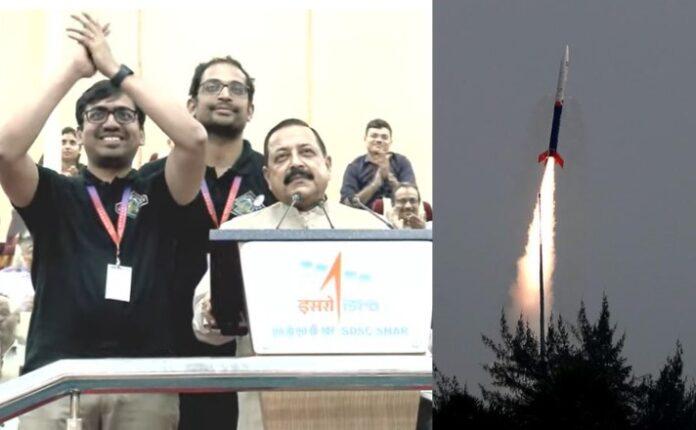Skyroot Vikram-S has scripted history, the aerospace Indian Space-Tech startup, has successfully completed its mission launch, and created history being the first private sector rocket launch startup to send its first rocket called Vikram-S into space at 11:30 am from the ISRO launch center in Srihari Kota.
The Vikram-S rocket, the first of the Vikram-series took off from the ISRO (Indian Space Research Organization) launchpad in Sriharikota. This is the first private rocket launch taking place in India.
The jubiliant Skyroot founders and its team shared their joy on twitter and wrote: Launched! Vikram-S makes history as the first private rocket of India to grace the skies. We thank you all for being with us for this momentous occasion. The Vikram rocket can reach hypersonic speeds”. Pawan Kumar Chandana, Co-Founder of Skyroot.
“We made history today by launching India’s first private rocket. It is a symbol of new India, and just the #Prarambh of a great future.” Pawan Kumar Chandana, Co-Founder Skyroot Aerospace said.
The Rocket in its maiden flight achieved 89.5 Kms peak altitude. Vikram-S rocket also met all flight parameters.
Vikram-S is a single stage fuel rocket meant to test most systems and processes in Skyroot Aerospace’s project ahead of the launch of Vikram-1 scheduled for next year. The launch today is also a sub-orbital one, meaning the vehicle will reach outer space, it will not remain in orbit around the Earth, with the flight time being less than five minutes.
Highlights of Skyroot Vikram-S Rocket
Vikram-S Key highlights
Mass: 546 Kg
Length: 8 M ( approx. 27 ft)
Diameter : 0.376m ( Approx. 1.24 ft)
Peak Volume Thrust
7t ( 7000 Kg)
Peak Combustion Pressure
80 bar
Peak Velocity
March 5 ( Hypersonic )
Payload Capacity
83 Kg to 100 Km altitude
Vikram S has an all-carbon fibre core structure
It is equipped with 3d Printed engines for spin stability during flight
It is one of the cheapest rockets built in its category, globally
A 200 engineering team worked to built it in a record time of 2 years
Launch to test
80% of onboard technologies for company’s future Vikram Series Launches
Effectiveness of inflight avionics, including telemetry, tracking, inertial measurement, GPS, Camera and data acquisition and power systems



